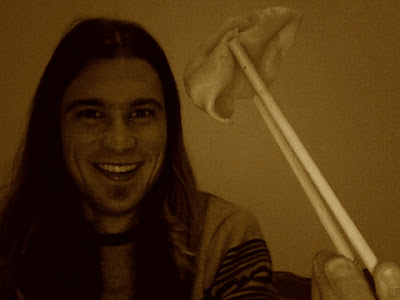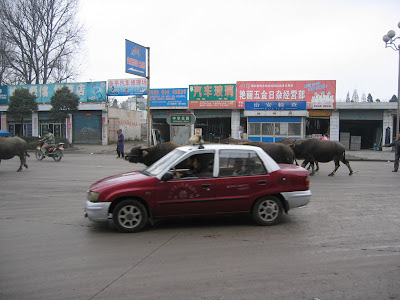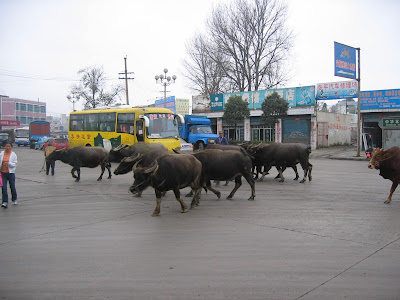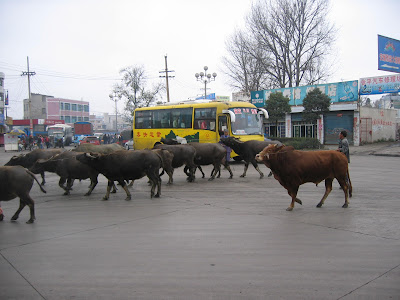During the final exam for phonetics over one hundred students filled two classrooms. A colleague monitored one class of fifty students and I monitored the other. The students generally complained that the exam was too difficult, but I explained that it is best if an exam’s roof is slightly out of reach. I’m not sure my point was well received, as the students continued to groan and sigh.
An hour into the test I caught two students helping one-another. I quietly took their tests and asked them to leave. Later a student was using an electronic dictionary under the desk and this student also had to go back to the dorms. Near the end of the exam, one student motioned for their neighbor to turn to a specific page in order to copy the answers (this was my interpretation from across the room).
The day before the phonetics exam, one student cheated on the listening final exam by using notes. The student was looking at me strangely during the test, so I decided to investigate. When I arrived at the listening station it looked as if their chair had a mattress tag: the student was sitting on a stack of cheat sheets and the front page was covered with the answers to questions on the listening final. At the student’s feet was a bag they had brought, which contained books and an extra pen. There was no way this student “accidentally” sat on the notes when they could have put them in the bag instead. And yet, the student protested that the notes weren’t being used.
The students during the phonetics final had similar excuses. I had felt so badly for them and then they began to give me excuses for their behavior. It was bad enough that they had cheated, but when they began to give excuses it made them seem to have no moral compunction. Couldn’t they just admit they had made a mistake? Maybe not.
I have realized that writing helps me and it also fills me with questions. As I write I begin to understand more about my feelings and the cultural responses in this country. The drawback is that I begin to encounter questions that I have no time to explore, and this case is a prime example. What time do I have to try and comprehend the difference in morality based upon cultural and historical teachings? Besides, I lack the cultural knowledge to answer this question fully. These experiences can only add to my growing body of knowledge about China.
I am almost certain the students didn’t understand how I felt, but most of them apologized anyway. After such efforts to try and explain away the cheating, the apologies seemed like last-ditch efforts to avoid punishment rather than sincere feelings. It would be easy to see my feelings about the cheating as something like anger or a sense of the students “letting me down.” But I did not feel these things. I was confused and upset, but mostly I was sad. I had not expected deliberate cheating. The entire incident has led me down the dangerous road of generalization, but knowing that students cheat in America too helps me to avoid this.
I want to address why I feel the students cheated (and why I think most people cheat). The students were taking an important exam. The benefit of cheating is clear: a higher score on the exam. The drawback is not quite so clear and, in some ways, more flexible: the possibility of getting caught. The reaction of the teacher (unknown to them when they cheated) must have been worth the risk of being caught. Simple, right?
Did the students factor in the damage the cheating would do to our relationship? The very idea of cheating, though considered morally wrong in most cultures, is more flexible in China. Perhaps it is easier for a Chinese teacher to forgive a student who has cheated than it will be for me. Of course, all will be forgiven in time, but I may never again be able to trust these students fully. And worse, their cheating makes me suspect that there were more students who simply did not get caught. If I caught half of the students who were actually cheating (making me an expert catcher) then that means that 20% of the students were cheating.
Please note that these are only ruminations, not conclusions. This is yet another experience that has shown me just when I think I understand something about China or Chinese culture, I am given an entirely new problem to contemplate. This problem would be difficult enough in America, but adding language and cultural barriers makes it even more puzzling. On the positive side, perhaps some students will be affected by this event and decide to never cheat again. How I deal with the problem in the next few days will likely determine what they will do in the future. Should I simply give them all zeroes? Offer them another test for possible full credit? Something between these extremes?
Maybe the school needs to formulate and teach an honor code to help the students govern their own morality. Or maybe (and I doubt it, but one never knows) cheating is an important part of being successful in Chinese society: maybe those who are cheated are the fools and the cheaters are the heroes. It’s like our president once said: “Fool me once, shame on – shame on you. Fool me twice…you can’t get fooled again.”
12.28.2007
12.22.2007
What do people do what I tell them...
...I'm studying Chinese?
This was a trick question. Or, at least, it doesn't have one clear answer. Generally I get strange looks from them. Sometimes I get a laugh. I get one of those there-is-no-way-you-could-possibly-learn-Chinese-it's-way-too-difficult kinds of laughs. Or I get the same thing as a skeptical, but curious scrunched up face: "really? Let me see those flashcards!" as they shuffle through looking for the most difficult characters. "What about this one?" they ask.
"fu." I say.
"But what does it MEAN?" they ask.
"government." I respond.
"No, government OFFICE." they correct me gleefully.
What exactly is this? I don't know. But I see it often. I can do the smallest thing, but if it doesn't fit into the proper tradition, I will be corrected. Sometimes I drink tea too quickly, or I write my question marks incorrectly, or I walk on the wrong side of the street, or I do something which doesn't matter except for the fact that it is new and different - but it is wrong and I will be informed.
Growing tired of this (can't you tell?) I have begun to ask questions and challenge students as they use tradition for justification of trivialities. I try to get them to open their minds and think a little more freely. And I share with them what then becomes a cultural revelation: Americans don't like to hear about every little thing they have done wrong, especially when you don't provide any evidence that your method is any better than theirs. I hope I am truly speaking for Americans here and not only justifying my frustration with the constant correction.
Most Chinese people are very happy to receive direct feedback about being wrong. In fact, criticism is seen in Chinese culture to be motivating and healthy. Chinese students mostly want to know that they are wrong and how to improve. This fact, blended with trusting authority and textbooks, makes for people who are more than willing to help you out when you foolishly bring 12 ounces of coffee to class instead of 6 ("It's bad for your health, you know!").
As for the language learning, I think people are genuinely surprised whenever a foreigner is interested in learning Chinese (especially in rural China). But I won't expect any pats on the back or way-to-gos any time soon (if ever). I will continue studying and listening in on the very interesting Chinese conversations about the foreigner on the bus. Looking around, I realize that this foreigner must be me. "Don't worry, he doesn't understand." one says to the other, mid-conversation.
"Are you sure?" I ask in Chinese. "Maybe my Chinese isn't so bad." I live for these moments.
This was a trick question. Or, at least, it doesn't have one clear answer. Generally I get strange looks from them. Sometimes I get a laugh. I get one of those there-is-no-way-you-could-possibly-learn-Chinese-it's-way-too-difficult kinds of laughs. Or I get the same thing as a skeptical, but curious scrunched up face: "really? Let me see those flashcards!" as they shuffle through looking for the most difficult characters. "What about this one?" they ask.
"fu." I say.
"But what does it MEAN?" they ask.
"government." I respond.
"No, government OFFICE." they correct me gleefully.
What exactly is this? I don't know. But I see it often. I can do the smallest thing, but if it doesn't fit into the proper tradition, I will be corrected. Sometimes I drink tea too quickly, or I write my question marks incorrectly, or I walk on the wrong side of the street, or I do something which doesn't matter except for the fact that it is new and different - but it is wrong and I will be informed.
Growing tired of this (can't you tell?) I have begun to ask questions and challenge students as they use tradition for justification of trivialities. I try to get them to open their minds and think a little more freely. And I share with them what then becomes a cultural revelation: Americans don't like to hear about every little thing they have done wrong, especially when you don't provide any evidence that your method is any better than theirs. I hope I am truly speaking for Americans here and not only justifying my frustration with the constant correction.
Most Chinese people are very happy to receive direct feedback about being wrong. In fact, criticism is seen in Chinese culture to be motivating and healthy. Chinese students mostly want to know that they are wrong and how to improve. This fact, blended with trusting authority and textbooks, makes for people who are more than willing to help you out when you foolishly bring 12 ounces of coffee to class instead of 6 ("It's bad for your health, you know!").
As for the language learning, I think people are genuinely surprised whenever a foreigner is interested in learning Chinese (especially in rural China). But I won't expect any pats on the back or way-to-gos any time soon (if ever). I will continue studying and listening in on the very interesting Chinese conversations about the foreigner on the bus. Looking around, I realize that this foreigner must be me. "Don't worry, he doesn't understand." one says to the other, mid-conversation.
"Are you sure?" I ask in Chinese. "Maybe my Chinese isn't so bad." I live for these moments.
Coal
When I first saw this I finally understood why it was so smoggy on campus sometimes. In the photograph the wind is doing its job well. The smoke from the burning coal is pulled away from the campus, or at least over our heads. But the wind isn't always blowing, and often the smoke tends to collect around the campus. Some days we must walk through a thin haze of this smoke. Carbon Dioxide and Sulfur Dioxide are the main by-products, but I'm not sure which one makes you cough. We usually use our t-shirts as filter masks and it's generally enough for me. This struck me as a genuine problem that I could help remedy. Again I marched forward to help the community and again I was left only with my own ignorance to ponder at the end.
I have been in China long enough to understand that there are many things I cannot expect to happen. I know that there are a lot of things that people don't want to think about and they prefer to push the blame upwards and away (if only this would happen consistently with the smoke). I figured I would begin with the students and go from there. Before I started to ask students about the smoke, however, I wondered if I were going to far. What was this smoke doing? I mean, of course, by becoming smoke (from it's previous state as coal) it was serving a purpose. I allowed the question to rest in the back of my mind as I questioned students about the smoke. Universally students agreed that the smoke was very bad and that everyone would be healthier without it. Step one complete. Most of the students followed this with the following phrase: 没办法 (mei banfa), which basically means "there is no other way" or "we have no choice." Immediately thinking this was due to government or school officials generally not allowing a change I blindly continued to think of ways to make a change.
I decided to at least raise some awareness about the problem. Again I wondered about what the coal was heating and if, perhaps, closing this place down would put a family out of work. Would that be worthwhile? How do I decide what should happen in such a case, especially since I am a foreigner living abroad? I could find these details out later, I thought, and I continued to think about how to present an awareness campaign. Already I had plenty of willing English majors to help with translation. A little knowledge from reputable sources could lead to posters and potential lectures. Finding a way to convince school officials to allow posters and lectures to occur was another hurdle I had to clear. As it turns out, I never had to do this.
While walking with some students after dark I commented on the smoke and pointed to the place that we couldn't see (it was all the way across campus and it was dark, but we could still smell and taste the smoke in the air). The students looked at me and gave me the same response: "We have no choice." This time I was ready to inspire them and ignite their passions against a gross injustice: their right to breathe clean air was being violated! "But why not?" I asked, "You can change it if you really want to!" They looked at one another, spoke in Chinese, and then one turned to me and said in English, "If they stop the smoke we will not have warm showers."
I was shocked. I felt such shame at ever thinking I could presumptuous enough to spread awareness about something which was such a difficult situation. I felt sad, too. There really isn't much of a choice. In China, 85% of the electricity alone comes from coal, not to mention the coal used for heat alone. America uses approximately 1 billion tons of coal compared with 2.5 billion tons in China. Energy is valuable and coal is cheap; what can we do?
"So what now?" I often think. What can I do, besides sit here and watch it happen? I can boil in my own anger, but more often I am caught thinking the same thing over and over again: there is no choice and that hurts. In America, what we consider basic rights are not always honored in China. Sometimes I felt that I could do anything in America, and in China I have not been able to suppress this. Instead of realizing the limitations, I struggle and fight against it (at least mentally). For now I will keep my ears and eyes open for solutions to this and other problems, looking for a way that I can help. I can only hope that 2 years do not slip past before I find a way to make a positive change.
12.14.2007
Language Learning
As my language learning has progressed I have finally entered the world of Chinese Characters. This world can be a mysterious forest of slashes, dots and slightly curved lines. Continued study, however, leads to finding patterns between the characters and the realization that some things make a lot of sense.
I searched the internet to find a Character test because I'm no longer sure how many Characters I know. It was easy at first. I knew about 5 characters... and then 10... and then 20... but now? Anyway, I found only one website with a good character test called Clavis Sinica. In addition to having a free test they also included Chinese studying materials for a variety of skill levels. Unfortunately, my internet was too slow to take the test. But there was another option: buy the test and the study materials.
As you may or may not know, my salary is not a huge sum. In fact, I find it difficult to afford something in the, say, $10 area. I was really frustrated because this was the only good character test online and I had no way of taking it.
So I did what I always do in these situations: I asked the website if they would give me the software for free, explaining that I am a Peace Corps Volunteer who is genuinely interested in learning the language. And they said yes.
From America you can probably take the character test for free because your internet connection is likely to be fast enough.
I searched the internet to find a Character test because I'm no longer sure how many Characters I know. It was easy at first. I knew about 5 characters... and then 10... and then 20... but now? Anyway, I found only one website with a good character test called Clavis Sinica. In addition to having a free test they also included Chinese studying materials for a variety of skill levels. Unfortunately, my internet was too slow to take the test. But there was another option: buy the test and the study materials.
As you may or may not know, my salary is not a huge sum. In fact, I find it difficult to afford something in the, say, $10 area. I was really frustrated because this was the only good character test online and I had no way of taking it.
So I did what I always do in these situations: I asked the website if they would give me the software for free, explaining that I am a Peace Corps Volunteer who is genuinely interested in learning the language. And they said yes.
From America you can probably take the character test for free because your internet connection is likely to be fast enough.
12.12.2007
Food

If this wasn't my reason before, it is now. I came for the food.
The thin veil of Altruism and Adventure cannot hide the perfect jiaozi, boiled with eggs, cucumbers and onions tucked neatly inside the hand-crafted dough. And guess who made it? That's right - I did! Actually...
My tutor's mother made the filling and she made the dough. She rolled the dough into little circles and I added the filling and shaped the jiaozi. Essentially I did about 10 percent of the work.
In America we discuss food by asking people what kind they like. For example, we might say, "Do you like Mexican food, Chinese food, Italian food...?"
In China, people also ask what kind of food I like. What kind of CHINESE food. There are not a lot of alternatives. In fact, I am almost certain I couldn't throw a stone and hit a Starbucks or McDonalds. So people might ask: "Do you like sweet food?" or "Do you like spicy, numbing food?"
At a banquet in early November I nearly broke down sobbing after realizing that I had spent 25 years of my life completely ignorant of the deliciousness of Chinese food. I have seen the light.
next post: water buffaloes cross main street in downtown Anshun.
12.10.2007
12.08.2007
Poisonous Banana?
The voting dash-bar has become a self-fulfilling prophecy. Indeed, if you replace the word 'banana' with 'beans' and 'did not get sick' with 'got sick' then it has...
What can I say? I was rooting around near the floor of my larder when to my surprise I found some dry white beans. Immediately several ideas ran through my head, but instead of waiting until the next day for a beanstalk to grow next to my apartment, I soaked them in a pan immediately.
24 hours later the beans were being cooked and 5 hours after that I was waking up in the middle of the night wondering what was living in my stomach and why they were already stringing Christmas lights across its lining.
Who knows what step in the process this was... Perhaps the fact that I did not adequately wash the beans, or that they were poorly soaked (although 24 hours, the water level was low by the end), or the fact that I have no idea how old they were: The possibility is up to 4 years, but I'm assuming between 6-12 months.
More justification for going out to eat!
What can I say? I was rooting around near the floor of my larder when to my surprise I found some dry white beans. Immediately several ideas ran through my head, but instead of waiting until the next day for a beanstalk to grow next to my apartment, I soaked them in a pan immediately.
24 hours later the beans were being cooked and 5 hours after that I was waking up in the middle of the night wondering what was living in my stomach and why they were already stringing Christmas lights across its lining.
Who knows what step in the process this was... Perhaps the fact that I did not adequately wash the beans, or that they were poorly soaked (although 24 hours, the water level was low by the end), or the fact that I have no idea how old they were: The possibility is up to 4 years, but I'm assuming between 6-12 months.
More justification for going out to eat!
Another Post

What's this?
Yes. It's a boot.
But not just any boot. This boot has revived my belief in the magical foot people. Remember? Think back a moment to your childhood. Didn't we all believe in the magical foot people?
Ok, so you've never heard of them. Maybe it's only me. If so, I will advance my idea... you can take it or leave it - it's up to you.
According to my science, wearing these boots (actually, using the picture as a reference, I must use the singular. Let me rephrase: wearing this boot and another like it on my opposite foot...) has changed my ability to stay warm. There was a transformation that occurred: yesterday I was cold, today I am not. The only difference was the footwear. Unless, of course, the temperature was different - which destroys my hypothesis completely.
But if not... if it was the boots alone (Danner boots, 1000 grams thinsulate insulation) then I hope to convince you of my belief: These boots provide a save place for the little elves that live inside our feet to put coal in their mini-stoves and warm the body. Without protecting the foot properly, the elves are afraid and usually they will leave to begin cookie factories (they use entirely too many preservatives) or work for Santa (and sometimes they actually want to be dentists). The foot people respect a good, protective boot; get your own pair today! (No magical elves were harmed in the posting of this blog. Perhaps only the reader was harmed by author's gross overestimation of the reader's capacity for patience. If so, apologies. Perhaps I thought that using the statement, "My boots keep my feet warm" would be trite)
Subscribe to:
Posts (Atom)







